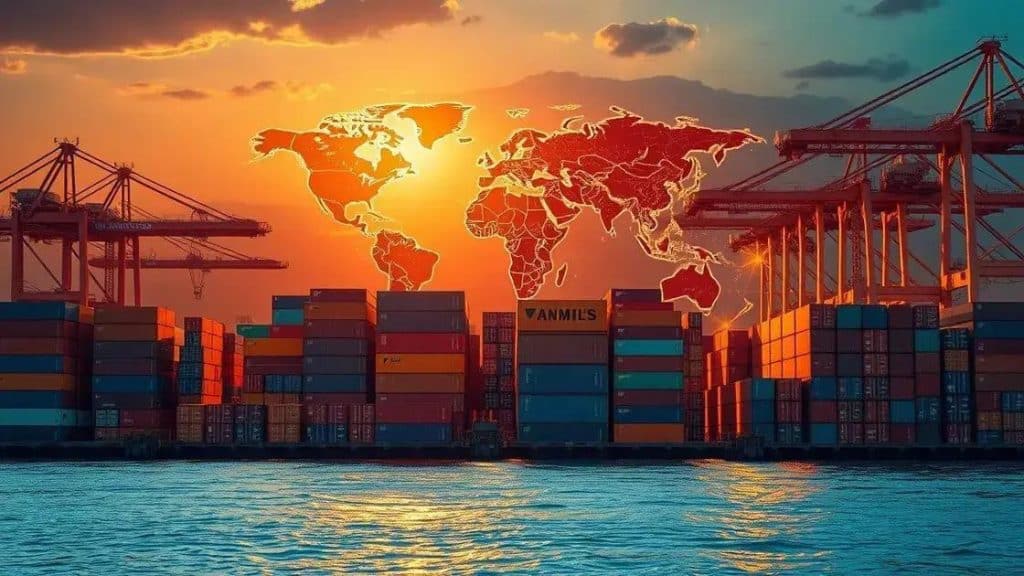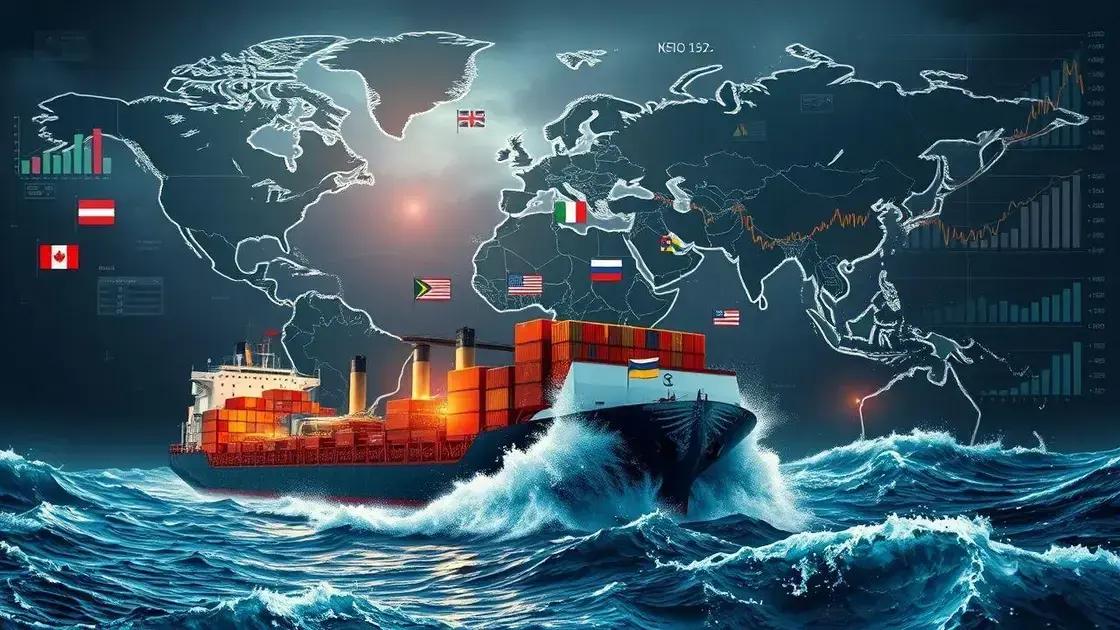Updates on international trade: what you need to know

Anúncios
Updates on international trade are shaped by trends such as technological innovations, shifting global dynamics, and the increasing importance of sustainability, necessitating adaptability from businesses to thrive in this evolving landscape.
Updates on international trade can affect everything from local businesses to global markets. Have you ever wondered how these changes shape your everyday life? Let’s dive into the key developments that matter.
Anúncios
Current trends in international trade
International trade is constantly evolving, influenced by various factors. Understanding the current trends in international trade can help businesses and consumers navigate this complex landscape.
Technological Advances
Technology plays a crucial role in reshaping how trade operates. Innovations in logistics and communication are streamlining supply chains and making international trade more efficient. Companies are adopting technologies like blockchain to enhance transparency and security in transactions.
Rising Protectionism
Another notable trend is the rise of protectionist policies in various countries. Governments are increasingly imposing tariffs and restrictions to protect local industries. These measures can disrupt trade relationships and affect prices globally.
Anúncios
- Increased tariff rates on certain goods.
- Stricter regulations on imports.
- Influence on global supply chains.
Alongside these changes, shifts in consumer behavior are shaping trade patterns. As consumers demand more sustainable products, companies are adapting their supply chains to meet these expectations. This embrace of sustainability can lead to new opportunities for businesses willing to pivot.
Global Supply Chain Resilience
Recent events have highlighted the need for resilience in global supply chains. Companies are reconsidering their sourcing strategies to avoid disruptions. This includes diversifying suppliers and considering nearshoring options.
Additionally, trade agreements are evolving to reflect these current trends. New partnerships and collaborations are being established to enhance economic stability. Businesses must stay informed about these changes to remain competitive in the global market.
Impact of global events on trade

Global events significantly influence international trade, affecting economies and businesses around the world. Understanding the impact of global events on trade is crucial for making informed decisions.
Economic Crises
Economic downturns, whether regional or global, can disrupt trade flows. During these times, consumer demand decreases, which can lead to lower exports and imports. Countries may also restrict trade to protect their economies.
- Decreased consumer spending leads to reduced demand for goods.
- Countries may implement trade barriers to boost local industries.
- International partnerships can strain under economic pressure.
Additionally, natural disasters can halt production and shipping, creating gaps in supply. These events highlight the importance of agility in trade practices to adapt to sudden changes.
Political Instability
Political unrest and instability within a country can have a ripple effect on international trade. When governments change or protests occur, it can disrupt supply chains and logistics. Exporters may face risks that deter them from engaging in trade with unstable regions.
Trade agreements may also be affected by shifts in political power. For example, a new government may reevaluate existing trade deals, which can lead to uncertainty for businesses relying on imports or exports.
Moreover, political relations between countries play a significant role. Favorable relationships can strengthen trade ties, while tension can result in sanctions and tariffs that stifle trade opportunities.
How businesses adapt to changing trade policies
As global trade policies shift, businesses must find ways to adapt effectively. Understanding how businesses adapt to changing trade policies is essential for staying competitive in today’s market.
Flexibility in Supply Chains
One way businesses adapt is by creating flexible supply chains. This means they can quickly change suppliers or sources of materials based on new regulations or tariffs. By diversifying their suppliers, companies reduce the risk associated with relying on a single source.
- Utilizing multiple suppliers to ensure consistency.
- Exploring local sourcing to minimize shipping delays.
- Investing in technology to facilitate quicker adjustments.
Flexibility allows companies to respond rapidly to changes in trade agreements while maintaining productivity.
Strategic Partnerships
Another strategy involves forming strategic partnerships with other businesses. These collaborations can help share resources and knowledge to navigate complex trade environments. Working together, companies can better understand compliance requirements and share the load of new costs.
For example, a manufacturer might partner with a logistics firm to ensure that shipping meets new trade regulations. Additionally, businesses are often proactive by attending trade compliance workshops to stay informed of the latest changes.
Furthermore, staying connected with industry associations can provide valuable insights into shifting regulations and best practices for adapting. By leveraging shared information, companies can enhance their resilience against policy changes.
Future predictions for international trade

The future of international trade is a topic of great interest as various factors will shape its evolution. Understanding future predictions for international trade helps businesses and consumers prepare for upcoming changes.
Technological Innovations
We’re likely to see advancements in technology that fundamentally change how trade is conducted. Innovations such as artificial intelligence and machine learning may streamline logistics and enhance decision-making processes. These technologies can predict demand, optimize routes, and reduce costs.
- Increased automation in supply chains.
- Enhanced data analysis for market trends.
- Improved customer experience through tech integration.
As technology evolves, businesses that adopt these innovations early will gain a competitive advantage.
Shifts in Global Power Dynamics
Global power dynamics are also changing, influencing trade relationships. Emerging economies are gaining strength and may reshape trade routes and agreements. Countries like India and Brazil are becoming more significant players, potentially leading to shifts in traditional trading partnerships.
These changes could lead to more regionally focused trade agreements, shifting the reliance on established trading partners. Businesses should stay informed about these dynamics and adapt accordingly.
Furthermore, sustainability is becoming a key factor in shaping future trade policies. As environmental concerns rise, businesses will need to consider eco-friendly practices and sustainable sourcing to meet new regulations and consumer expectations.
FAQ – Frequently Asked Questions about International Trade
What are the key trends affecting international trade today?
Key trends include technological advancements, rising protectionism, and shifting consumer preferences toward sustainability.
How do global events impact trade policies?
Global events such as economic crises and political instability can disrupt trade flows and alter trade relations between countries.
How can businesses prepare for changes in trade policies?
Businesses can prepare by adopting flexible supply chains, forming strategic partnerships, and staying informed about market trends and compliance requirements.
Why is sustainability important in international trade?
Sustainability is becoming a focal point as consumers demand eco-friendly practices, influencing trade regulations and business strategies.





